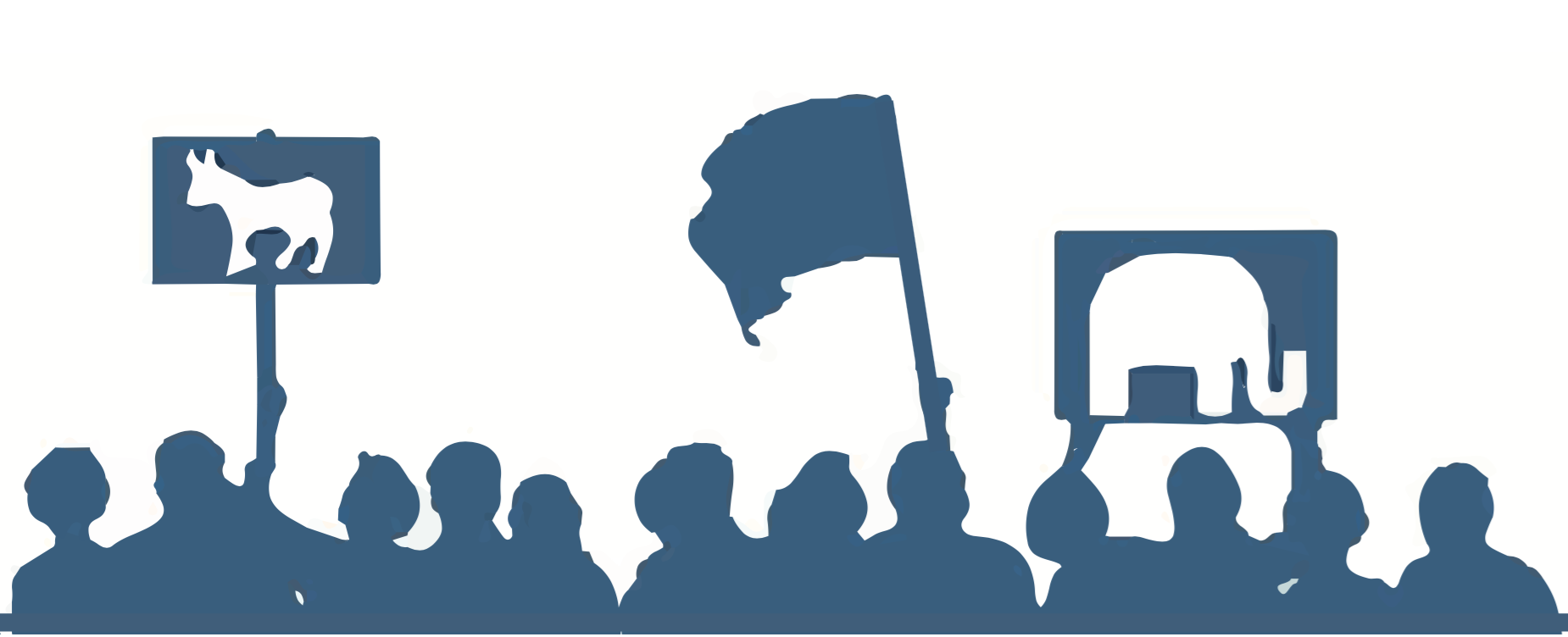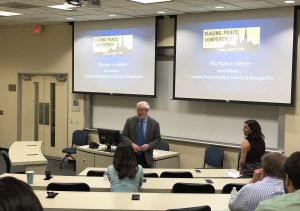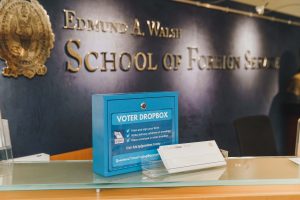Georgetown students on campus in 2009 were living in the heart of political upheaval. Barack Obama, the first black president, brought Democrats back to the White House for the first time since a Hoya sat in the Oval Office.
Now, at the end of the decade, 1600 Pennsylvania Ave. is occupied by Republican former real estate magnate and reality TV star Donald Trump, and students on campus have met rising partisan tensions in the country with calls for unity—or at least civility—across political fault lines.
The flocks of students in suits heading to their unpaid internships on the Capitol Hill GUTS bus each morning are one of the most visible examples that a large segment of the campus is interested in politics. It is a Georgetown tradition to run down to the White House after presidential elections are called every four years, while politicians like Paul Ryan and Hillary Clinton are almost daily sights on campus. Student political groups invite speakers, host phone banks, and travel to the Hill to lobby for the national issues that most closely affect young college students, among them college affordability, gun control, and reproductive rights.
In recent years, Georgetown students have joined some of the largest protests in history, like the first Women’s March, which brought 500,000 protesters to the city for various women’s rights issues the day after Donald Trump’s inauguration, and the March for Life, an annual protest against abortion.
The small campus is a microcosm of controversy for larger, national debates: When one student group advocates for a particular issue, another will appear almost instantaneously to combat them. Within one month in 2018, the university president’s office received two opposing letters on arming GUPD, a mirror of the growing debate over gun control policies in Congress.
The passion of political groups on campus has given Varsha Menon (SFS ’21), the treasurer of the College Democrats (GUCD), an outlet to fight for her political ideals in a way that was not available in her Texas hometown.
“When I came to Georgetown, one thing I knew is that I wanted to work for Democratic causes and do a lot of activism behind that,” Menon said. “I never got to really do that when I was in high school, and I felt really powerless when the 2016 election happened.”
At the same time, a common interest in politics has helped students learn about ideas from across the aisle, said Dolan Nunamaker (COL ’22), chair of campus relations for College Republicans (GUCR). “I had some hesitations about coming to an East Coast, kind of elite school, especially with being from mid-Missouri,” Nunamaker said. “But for the most part, the vast majority of people that I meet with are interested in hearing about a different perspective.”
Mo Elleithee (SFS ’94), the founding executive director of the Georgetown Institute of Politics and Public Service (GU Politics), said that Americans have created echo chambers through their social media and news feeds, adding to the polarization of the nation.
“We are completely, through a series of conscious and subconscious choices, isolating ourselves from different perspectives,” Elleithee said. “And when we isolate ourselves from other perspectives, we tend to demonize other perspectives. We’re starting to hate each other as people a lot more.”
College campuses are part of the trend: A 2016 survey by the UCLA Higher Education Research Institute found college campuses have become more partisan—and more liberal—over the last decade.
But Elleithee said the “Democrat” versus “Republican” tension that defined his experience as a student at Georgetown in the 1990s has shifted to an “outsider” versus “insider” conflict that has brought a recent resurgence of populist politics. Early in the decade, this new politics advanced nationally through movements like the Tea Party and Occupy Wall Street but struggled to grow on campus.
In 2010, the Voice reported that conservative groups on campus had not adopted the “populist energy, tone, and activist tendencies of the Tea Party,” a socially and fiscally conservative movement within the Republican Party. And when progressive backlash against economic inequality and politicians’ lax response to the financial crisis led to the populist Occupy Wall Street movement in 2011, Georgetown students’ reactions were split. Some traveled to New York to join the protests or—closer to campus—Occupy D.C.’s encampment in McPherson Square. Despite the efforts of GU Occupy, the movement’s biggest presence in many students’ lives stopped at referring to a day in the library as “Occupying Lau.”
GU Occupy joined protests on Copley Lawn when former Speaker of the House Newt Gingrich (R-Ga.) came to campus in 2012. Some students argued that Gingrich, who was running for president at the time, should be given a platform, while others protested his invitation from the Georgetown Lecture Fund, a non-partisan student group that brings various speakers to campus.
“There is nothing civil about Newt’s inflammatory anti-immigrant, anti-gay, anti-welfare, and anti-equality rhetoric,” protestor Beth Goldberg (SFS ’12) said at the time.
Since then, debate over whether colleges can restrict speakers whose views are seen as offensive or harmful has come to the forefront of conservative-liberal tension, each side contending what “free speech” actually entails. On March 21, 2019, Trump—surrounded by conservative student activists—signed an executive order requiring universities to protect free speech on campus or risk losing federal funding.
At Georgetown, both sides of the political spectrum have claimed that their free speech has been limited. When the Lecture Fund invited then-president of Planned Parenthood Cecile Richards to campus in 2016, the backlash from Catholic students and alumni spurred university administration to provide spaces for protesters and pro-life panels during her appearance. Despite the controversy, University President John DeGioia defended his decision to allow Richards’ speech: More free speech is always better, he told the Voice in 2017.
Despite increasing political polarization around the country, Lauren Dailey (COL ’20), vice-president of the four-year-old Georgetown Bipartisanship Coalition, credited recent GUCR and GUCD leadership with working to find common ground. This cooperation includes roundtables on issues like the opioid crisis and environmental policy as well as joint presidential debate watch parties.
“People are willing to talk now,” she said. “Yes, they have their opinions but I think they recognize that it’s important to share them in a way, with the other side, rather than just staying cooped up within their own groups.”
Elleithee, who has worked as a strategist for high-profile Democratic campaigns, helped found GU Politics in 2015 to encourage students to become engaged in public service. Since then, GU Politics has worked with student groups to bring politicians, journalists, and advocates to campus to discuss current political issues with students.
It does not mean students are less resolute about their own positions if they are willing to open a dialogue with the “opposing” side, said Elleithee. But he hopes the skills and resources they learn at Georgetown help them work toward political solutions to improve the country as a whole, regardless of their party. The day after the 2016 election, he said a group of Democratic students came into the GU Politics office asking him to bring in Trump supporters so they could better understand their perspectives.
“To me,” Elleithee said, “that really embodied what this program is about and what this campus is about: the ability to listen and learn as a way to become better advocates for whatever your advocacy, whatever your worldview may be.”
This article is part of our special 50th anniversary edition’s look back at Georgetown’s past decade.





